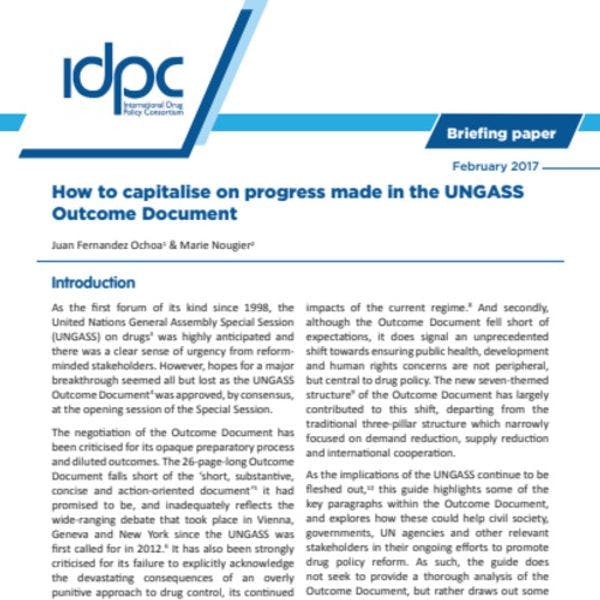How to capitalise on progress made in the UNGASS Outcome Document: A guide for advocacy
As the first forum of its kind since 1998, the United Nations General Assembly Special Session (UNGASS) on drugs was highly anticipated and there was a clear sense of urgency from reform-minded stakeholders. However, hopes for a major breakthrough seemed all but lost as theUNGASS Outcome Document was approved, by consensus, at the opening session of the Special Session.
The negotiation of the Outcome Document has been criticised for its opaque preparatory process and diluted outcomes. The 26-page-long Outcome Document falls short of the ‘short, substantive, concise and action-oriented document’ it had promised to be, and inadequately reflects the wide-ranging debate that took place in Vienna, Geneva and New York since the UNGASS was first called for in 2012. It has also been strongly criticised for its failure to explicitly acknowledge the devastating consequences of an overly punitive approach to drug control, its continued promotion of a world ‘free of drug abuse’, and the fact that most progressive paragraphs are heavily caveated with wording such as ‘as appropriate’ and ‘in accordance with national legislation’, among many other issues.
Nevertheless, the UNGASS and its Outcome Document represent a key milestone in the international debate on drug control. Firstly, the debates exposed the fault lines in the fractured global drug control ‘consensus’, with countries diverging on key issues such as the death penalty, harm reduction, decriminalisation, the legal regulation of drug markets and the negative impacts of the current regime. And secondly, although the Outcome Document fell short of expectations, it does signal an unprecedented shift towards ensuring public health, development and human rights concerns are not peripheral, but central to drug policy. The new seven-themed structure of the Outcome Document has largely contributed to this shift, departing from the traditional three-pillar structure which narrowly focused on demand reduction, supply reduction and international cooperation.
As the implications of the UNGASS continue to be fleshed out,this IDPC briefing paper highlights some of the key paragraphs within the Outcome Document, and explores how these could help civil society, governments, UN agencies and other relevant stakeholders in their ongoing efforts to promote drug policy reform. As such, the guide does not seek to provide a thorough analysis of the Outcome Document, but rather draws out some of the most progressive language included in the text, and explains how to use it for advocacy purposes.
Keep up-to-date with drug policy developments by subscribing to the IDPC Monthly Alert.
Downloads
Topics
Regions
Related Profiles
- International Drug Policy Consortium (IDPC)
